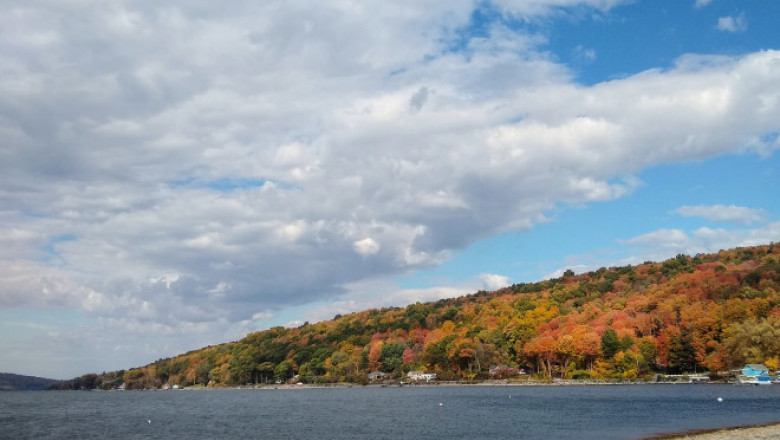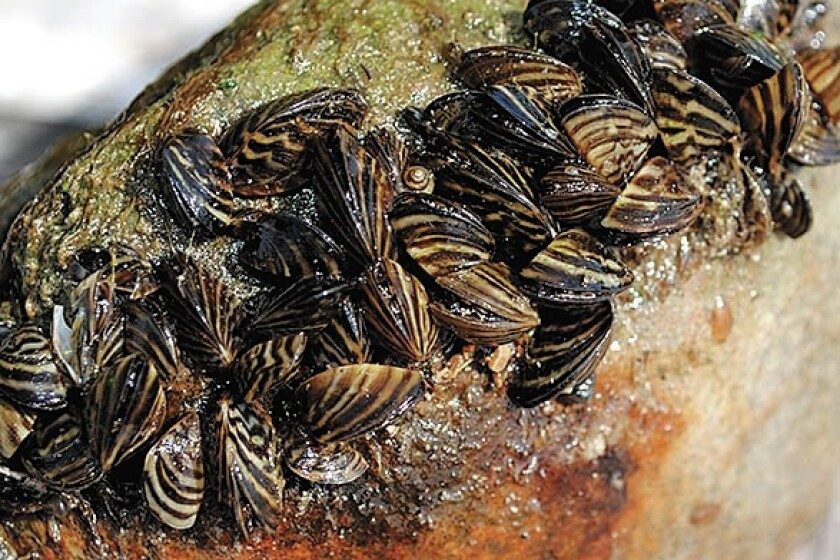
The south end of Otisco Lake, looking north on September 10, 2022. (Adam McIntyre)

The south end of Otisco Lake, looking north on September 10, 2022. (Adam McIntyre)
Otisco Lake is my second home and a truly special place, but it’s not the same as it used to be. This is where I spent huge quantities of my summers as a child swimming, tubing, camping, and doing other outdoor activities. However, Otisco Lake has been slowly but surely changing and it all started before I ever came along.
At first, these seemed to be positive changes as Tim Creamer, the President of the Otisco Lake Preservation Association described to me, saying that, “from 2003 to 2005 the lake was crystal clear,” with everyone in the community being, “excited about how clear and beautiful the lake was, but little did we know what was going to come next.”
According to Creamer, it all started with the introduction of the zebra mussel (Dreissena polymorpha) which is a clam-like bivalve mollusk that is native to the Ponto-Caspian region at the division of Europe and Asia, in countries such as Ukraine and southern Russia. Zebra mussels first made their way into the Great lakes in 1988 from the freshwater ballast of a cargo ship and have spread rapidly to many water bodies in the eastern United States including Otisco Lake.
Otisco Lake is in Onondaga County in New York and is the easternmost Finger Lake and the only one that flows into the Onondaga Lake watershed. The lake provides drinking water to the city of Syracuse, meaning that keeping the lake clean is a priority to the local as well as state government.
To find out the approximate time that the zebra mussel made it into Otisco Lake, as well as the effect that it had once it was introduced, I needed to talk to someone who has lived on the lake a lot longer than me and had been observing the water quality during that time. One such person who could tell me that was my dad, David McIntyre.
My dad has lived on the lake part-time for over 55 years and told me that around 25 years ago is when he first started seeing zebra mussels in small quantities. Within a few years, the population had exploded with my dad saying, “It didn’t take very long to start noticing that the water was getting clearer.” This is due to the zebra mussels’ status as a filter feeder in which they filter out phytoplankton, small zooplankton, and detritus from water causing it to become clearer. This causes the local algae and phytoplankton populations to decrease , both of which native species rely on for food. As the exploding population of zebra mussels continued to filter feed, the particles that blocked sunlight from penetrating to the bottom of the lake were removed allowing more macrophytes (weeds) to be able to grow.
My dad said that he first noticed macrophytes around 10 to 15 years ago, but they have become a big problem for people on the lake, as he described the current number of them as “very significant.” When asked what issues this has caused for him as well as people on the lake he said that the weeds are so thick that people may be at risk of drowning if they get into the wrong place. He also described one time when the weeds were so thick that they got caught around the propeller of our boat which caused the engine to overheat, both potentially very dangerous situations.

Creamer confirmed much of the information that my dad told me and said that 20 years ago, the water was free of weeds. Having lived on the lake for 36 years and having been involved with the Otisco Lake Preservation Association for 10 years, Creamer has formed a deep connection to the lake and the community that the lake has cultivated.
When asked why the weeds were such a problem, one of the main concerns he and those around him encountered was that they couldn’t access certain parts of the lake and kept getting stuck in the weeds. I then asked him what he would suggest for locals on the lake to do, and after pondering it for a minute, he said that locals need to be able to devote more time and energy to volunteering, for example, by applying for government grants to help with the problems on the lake.
Zebra mussels are not just a nuisance because they facilitate macrophyte growth, they also have other significant effects on the ecosystem. Zebra mussels will attach to and incapacitate native mussel species, completely overwhelming the natural balance of the ecosystem. Zebra mussels also clog water intake valves by growing on the surfaces of them, requiring that resources and capital must be spent removing them. Zebra mussels also are sharp, meaning that stepping on them may result in a nasty cut. I first had an experience with this when I was four years old, receiving a big cut on my knee which my dad called, “probably the worst (zebra mussel cut) I’ve seen.”
Since zebra mussels are such a problem for both ecosystems and recreation, many are wondering: What can be done about them? The answer is, not much. Many researchers believe that they are here to stay as no effective removal methods on a lake-wide scale have been found. However, both my dad and Creamer agreed that the number of zebra mussels appears to have gone down in recent years which could be due to a multitude of factors such as competition with other invasives such as quagga mussels (Dreissena bugensis) or potentially be due to predation as other organisms develop a taste for them.
Zebra mussels have many effects on the ecosystem of Otisco Lake but not all of them are necessarily negative. Many young fishes like to hide in the weeds that the mussels facilitate which increases the lake’s game fish population. In 2018, both largemouth and smallmouth bass population numbers were at an all-time high. An increased number of fish is good news for fishermen and also supports the local economy with people paying to launch their boats, buying bait and fishing equipment, and going to local restaurants after a good day on the water.
Creamer told me that we are fortunate to have the freshwater sources that we do, and if the zebra mussels (and weeds) in the lake are the biggest of our issues, then we don’t have it as bad as many other parts of the country when it comes to water. Zebra mussels and weeds are just something that the residents of Otisco Lake are going to have to live with for the foreseeable future in order to enjoy the lake.